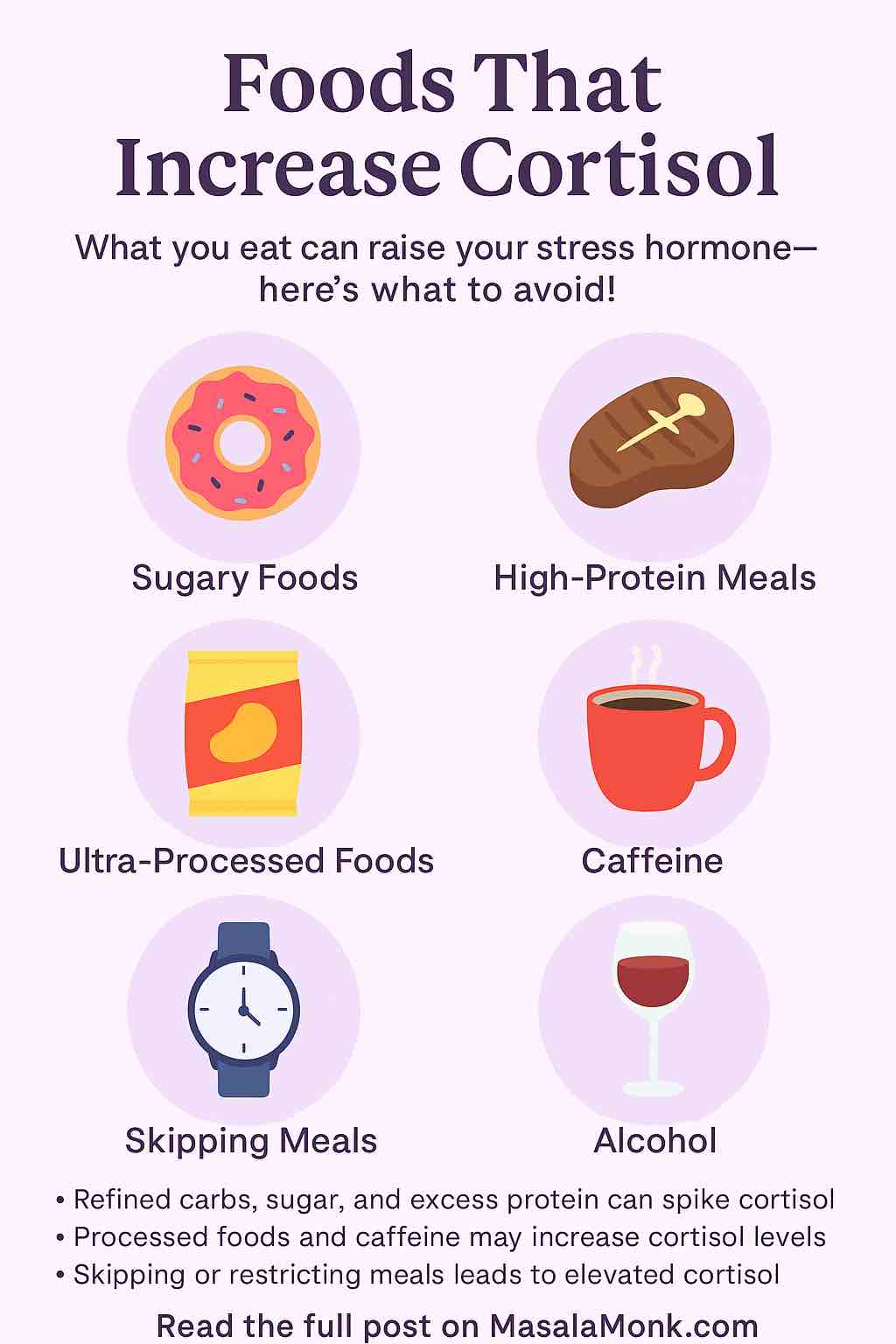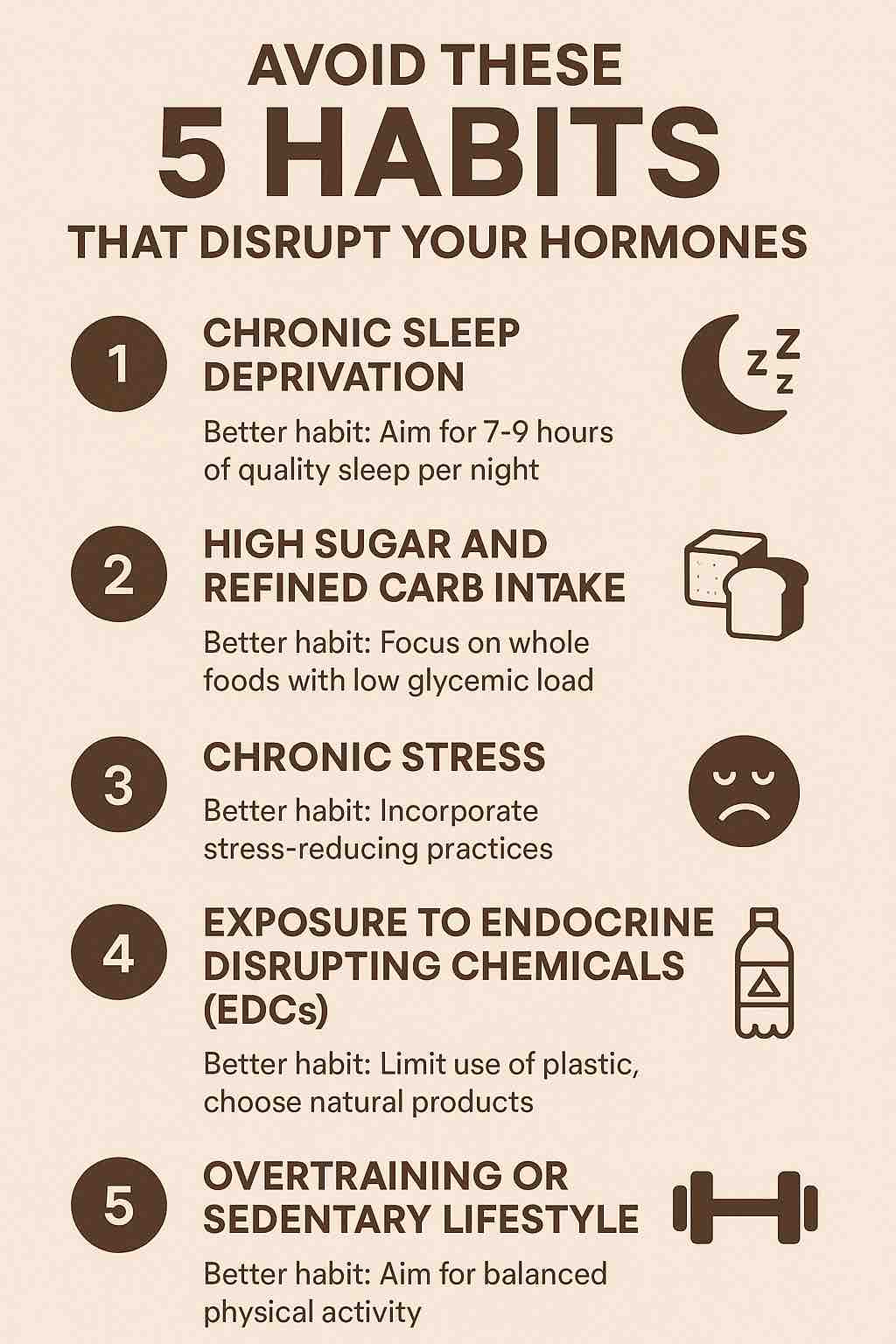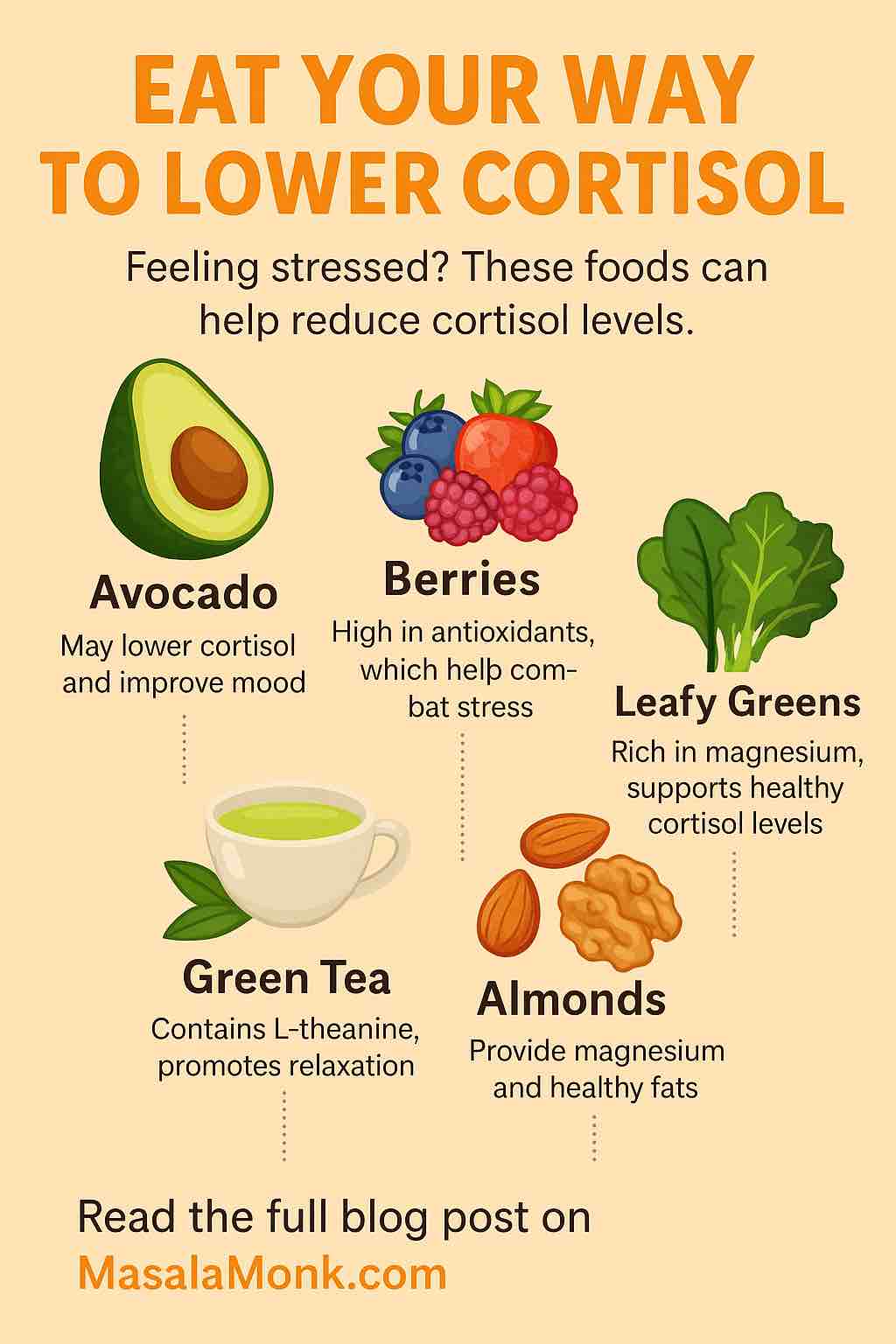
In today’s fast-paced world, stress is almost unavoidable. From relentless deadlines to late-night doomscrolling, our bodies often react by pumping out cortisol, commonly known as the “stress hormone.” While cortisol plays a vital role in metabolism and alertness, chronic high levels can wreak havoc on your health—triggering weight gain, insomnia, fatigue, anxiety, and even increasing your risk for heart disease.
🌟 What Is Cortisol and Why It Matters
Cortisol is your body’s built-in alarm system. Produced by the adrenal glands, this “stress hormone” helps regulate energy, blood sugar, metabolism, and even your sleep-wake cycle. In short bursts, cortisol is helpful — it keeps you alert, fuels your muscles, and sharpens focus when you need it most.
But here’s the catch: when cortisol stays elevated for too long (thanks to chronic stress, poor sleep, or diet), it can turn from friend to foe. Persistently high cortisol has been linked to:
- Belly fat and unexplained weight gain
- Trouble falling asleep or staying asleep
- Mood swings, anxiety, and brain fog
- Weakened immunity
- Increased risk of high blood pressure and heart disease
👉 The key isn’t eliminating cortisol altogether — you need it! — but bringing it back into balance so your body can function smoothly.
Also Read: Morning Anxiety? Your Cortisol Might Be to Blame — Here’s How to Fix It Naturally
⚠️ Signs Your Cortisol May Be Too High
Wondering if your stress hormone might be working overtime? Here are some common red flags:
- Poor sleep quality: Trouble winding down at night or waking up feeling wired.
- Weight gain around the midsection: Especially stubborn belly fat.
- Constant fatigue: Feeling drained even after a full night’s rest.
- Anxiety or irritability: Heightened “fight or flight” feelings throughout the day.
- Sugar or junk food cravings: High cortisol often drives comfort eating.
- Weakened immunity: Getting sick more often than usual.
Do Read: 10 Symptoms of High Cortisol Levels in Females
If several of these sound familiar, your cortisol levels may be higher than your body can comfortably handle. The good news? Small, consistent changes — especially in diet — can make a big difference in bringing those levels back into balance.
Also Read: How to Naturally Lower Cortisol Levels?
But here’s the good news: you can naturally balance your cortisol levels—starting with what’s on your plate.
Let’s explore five research-backed foods that can help you lower cortisol, manage stress, and boost overall well-being.
🥑 1. Avocados: Creamy Calm in Every Bite
Avocados aren’t just trendy—they’re a cortisol-fighting superfood.
Why They Work:
- Rich in potassium, which helps regulate blood pressure and reduces stress-induced heart strain.
- Packed with healthy monounsaturated fats, which improve brain function and support hormonal balance.
- Contain B-vitamins, which play a role in maintaining your nervous system and energy levels.
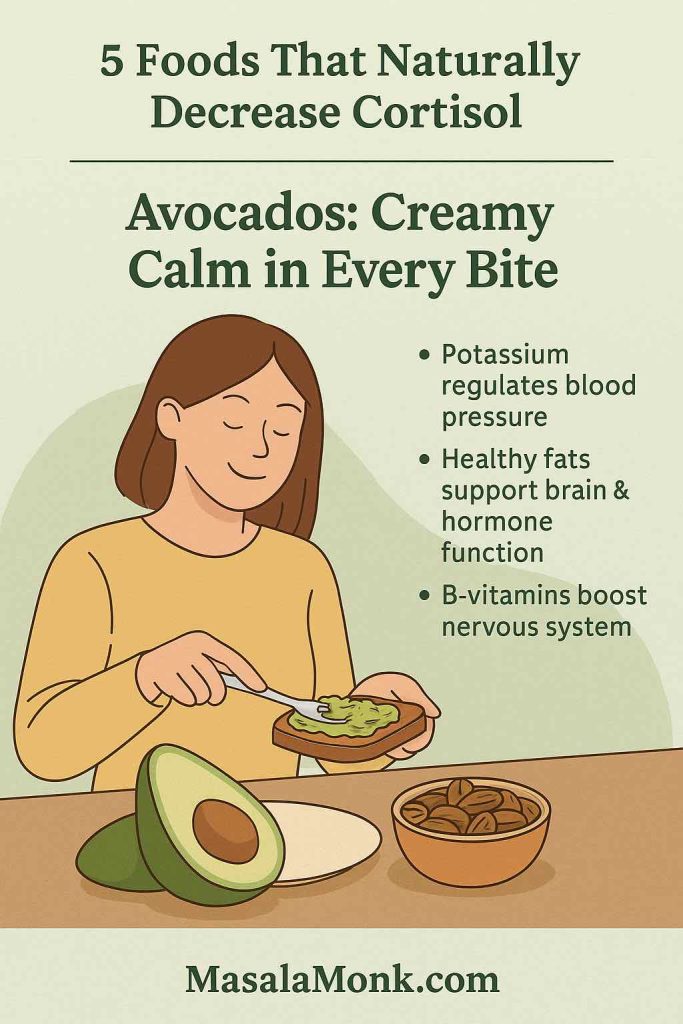
Research Insight:
A 2023 nutritional trial revealed that participants who ate half an avocado daily for six weeks showed a significant drop in cortisol levels, better mood scores, and improved heart rate variability—a key marker of stress resilience.
👉 Try This: Add avocado slices to your morning toast or blend them into a smoothie for a creamy, calming boost.
More about Avocado: The Avocado – Nutrition, Benefits, and 5 Practical Ways for Weight Loss
🫐 2. Berries: Antioxidant Armor Against Stress
Blueberries, strawberries, raspberries—besides being delicious, these vibrant fruits are your natural defense against cortisol spikes.
Why They Work:
- High in vitamin C, which helps reduce the body’s cortisol response to physical and psychological stress.
- Loaded with polyphenols, plant compounds known to reduce oxidative stress and inflammation.
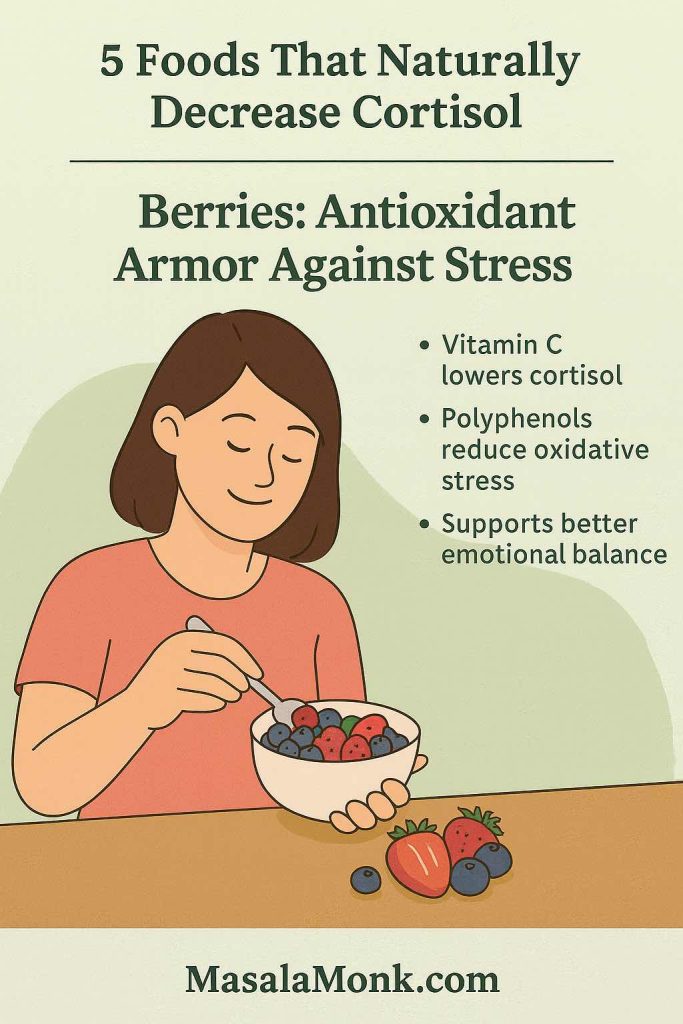
Research Insight:
A 2022 study found that individuals who consumed 2+ cups of berries weekly had lower evening cortisol levels and reported improved emotional regulation.
👉 Try This: Sprinkle fresh berries on yogurt, oatmeal, or enjoy them as a refreshing midday snack.
Do try: 5-Minute Yoga for Instant Stress Relief (Perfect for Busy Days)
🥦 3. Leafy Greens: Magnesium-Powered Stress Relief
Spinach, kale, Swiss chard—leafy greens may be the unsung heroes of stress management.
Why They Work:
- Rich in magnesium, a mineral essential for nervous system function and cortisol regulation.
- Magnesium deficiency has been directly linked to elevated stress and poor sleep.
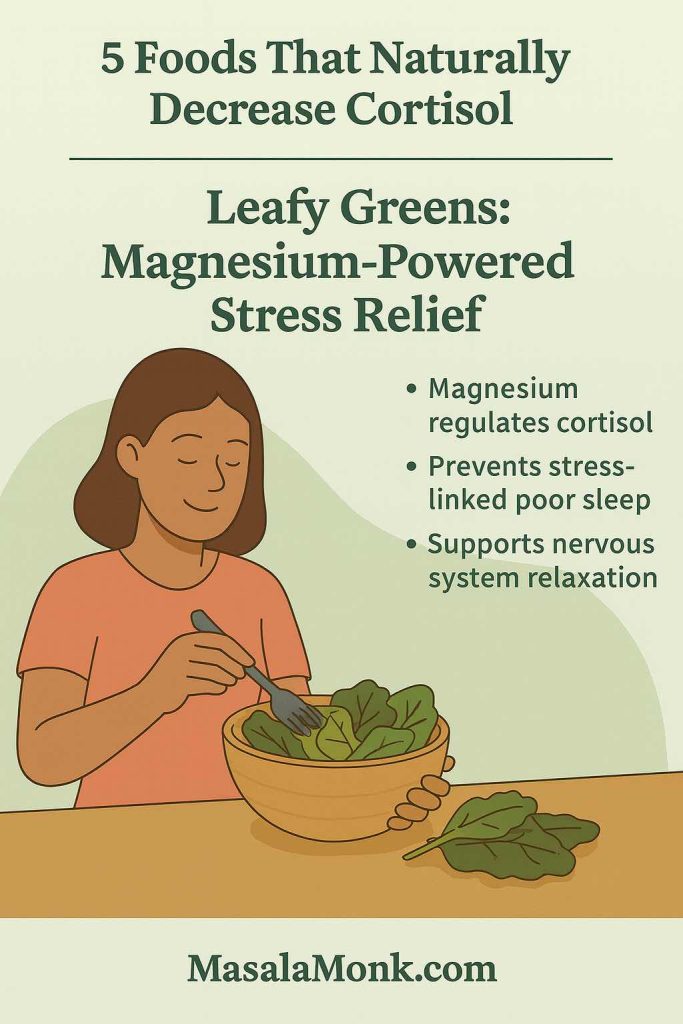
Research Insight:
Controlled studies show that diets high in magnesium (from greens and legumes) significantly reduced cortisol levels and enhanced relaxation responses in individuals under moderate stress.
👉 Try This: Blend a handful of spinach into your smoothie, or sauté kale with garlic as a side dish to your meals.
🍵 4. Green Tea: Calm Clarity in a Cup
There’s a reason monks sip green tea while meditating—its unique compounds soothe the brain while keeping you alert.
Why It Works:
- L-theanine, an amino acid, promotes relaxation and reduces the perception of stress without causing drowsiness.
- EGCG, a powerful antioxidant, helps buffer cortisol levels and protects brain cells from stress-induced damage.
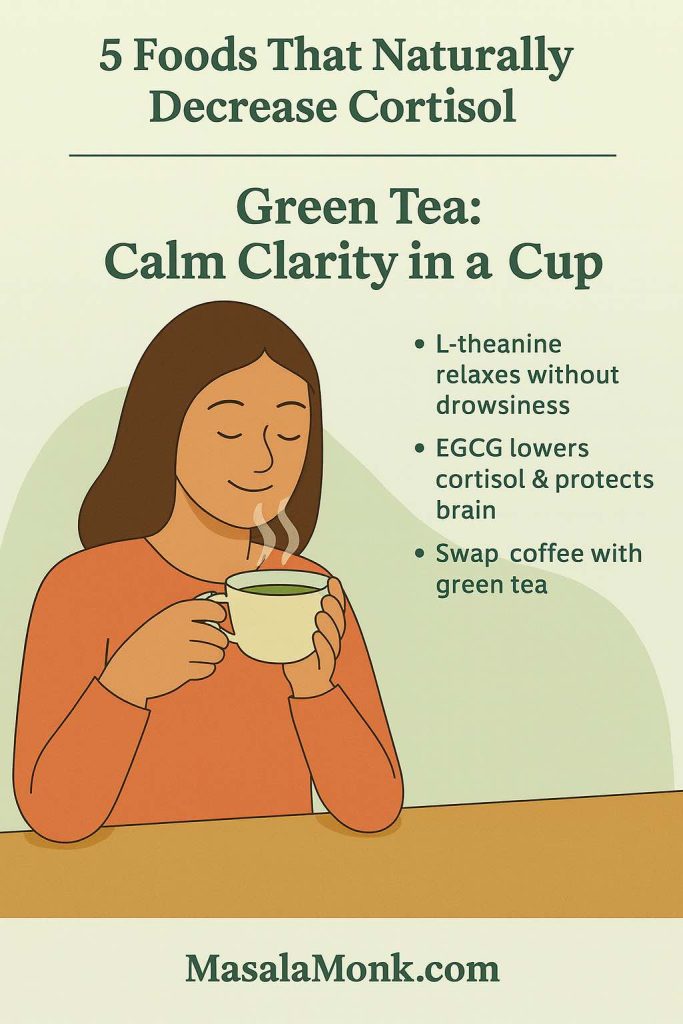
Research Insight:
A randomized trial found that participants who consumed green tea daily experienced a significant reduction in salivary cortisol levels, especially during periods of mental workload.
👉 Try This: Swap your afternoon coffee with green tea to lower cortisol while staying sharp.
Also Read: Coffee and Cortisol: How Your Daily Brew Impacts Stress, Weight, and Well-Being
🥜 5. Almonds & Walnuts: Stress-Busting Snack with Substance
These crunchy snacks are more than just filling—they’re functional.
Why They Work:
- Excellent sources of magnesium and healthy fats, both of which are key to reducing cortisol production.
- Contain tryptophan, an amino acid that supports serotonin production and mood balance.
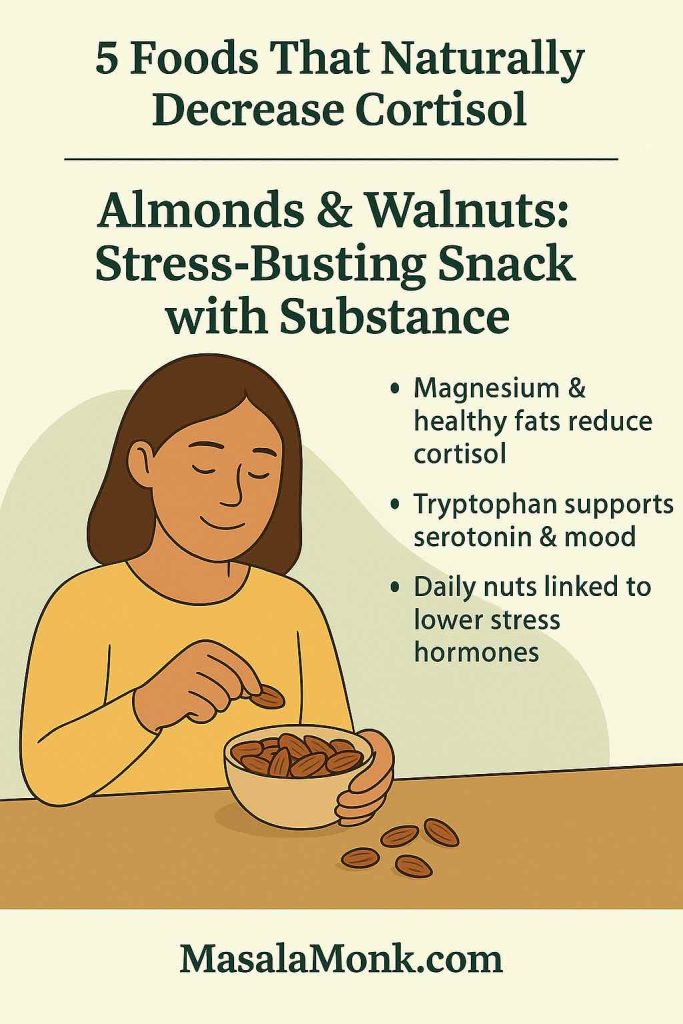
Research Insight:
In a 2021 dietary crossover study, participants who consumed a handful of nuts daily showed a marked decrease in morning cortisol levels compared to a nut-free group.
👉 Try This: Munch on a small mix of almonds and walnuts as a mid-morning snack—or sprinkle them onto salads or porridge.
🍽️ Other Cortisol-Friendly Foods Worth Adding
While avocados, berries, leafy greens, green tea, and nuts are superstar stress-busters, other foods can also support healthy cortisol balance and overall resilience. Consider weaving these into your diet for extra benefit:
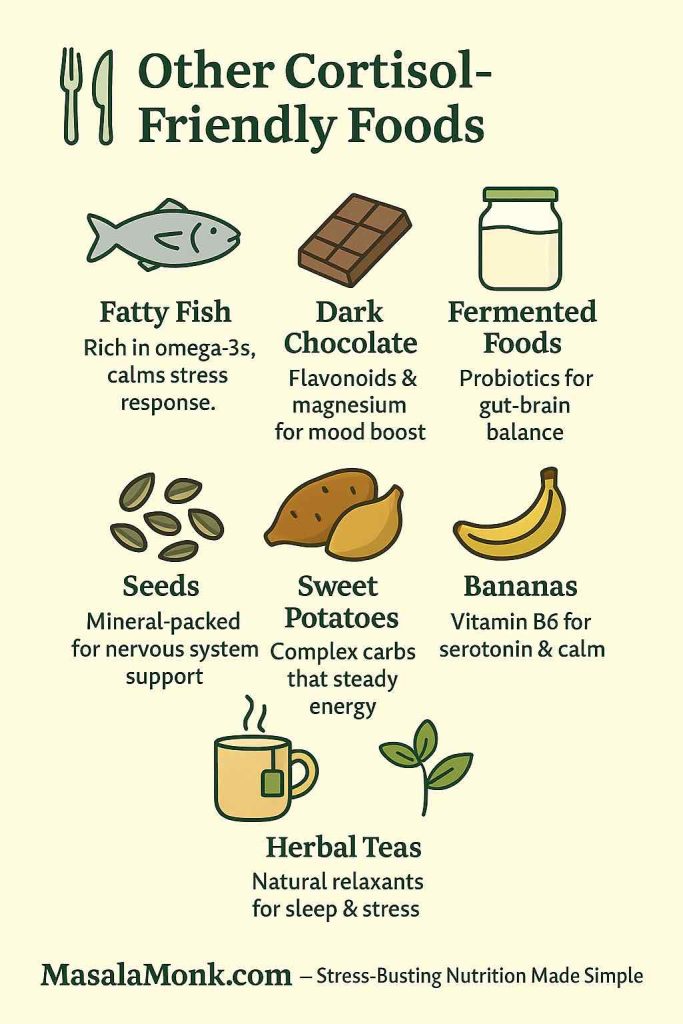
🐟 Fatty Fish • 🍫 Dark Chocolate • 🥛 Fermented Foods • 🌻 Seeds • 🥔 Sweet Potatoes • 🍌 Bananas • 🌿 Herbal Teas
Incorporate them into your meals for a calmer, healthier you.
🐟 Fatty Fish (Salmon, Sardines, Mackerel)
- Why They Work: Packed with omega-3 fatty acids (EPA & DHA), which help regulate the body’s stress response and lower inflammation.
- Research Insight: Clinical studies show omega-3 supplementation can reduce cortisol spikes by up to 33%.
👉 Try This: A salmon and avocado poke bowl for a double stress-busting combo.
Also Read: Fish Oil and Cortisol: Can Omega-3 Help You Manage Stress Hormones?
🍫 Dark Chocolate (70% or Higher)
- Why It Works: Rich in magnesium and flavonoids, dark chocolate helps improve mood and reduce perceived stress.
- Research Insight: A 2-week trial found that daily dark chocolate intake lowered cortisol biomarkers and improved calmness.
👉 Try This: Enjoy one or two small squares after lunch as a mindful treat.
🥛 Fermented Foods (Yogurt, Kefir, Sauerkraut, Kimchi)
- Why They Work: Probiotics in fermented foods strengthen the gut-brain axis, directly influencing stress and hormone regulation.
- Research Insight: People who regularly consumed probiotics showed lower cortisol levels and improved emotional balance.
👉 Try This: Add kefir to your smoothie or enjoy kimchi alongside rice bowls.
🌻 Seeds (Pumpkin, Flax, Chia, Sunflower)
- Why They Work: Rich in magnesium, zinc, and healthy fats—nutrients essential for nervous system regulation. Pumpkin seeds in particular are magnesium powerhouses.
👉 Try This: Sprinkle pumpkin or chia seeds over oatmeal or blend flaxseeds into your morning shake.
🥔 Sweet Potatoes
- Why They Work: Complex carbohydrates help stabilize blood sugar, preventing cortisol from spiking due to energy crashes.
👉 Try This: Roast sweet potato wedges with a dash of cinnamon for a comforting, cortisol-friendly side.
🍌 Bananas
- Why They Work: High in vitamin B6, bananas support serotonin production, mood balance, and blood pressure regulation.
👉 Try This: Blend into a spinach and almond butter smoothie for a stress-busting breakfast.
🌿 Herbal Teas (Chamomile, Ashwagandha, Lemon Balm)
- Why They Work: Naturally caffeine-free, these teas promote relaxation and better sleep—two keys to cortisol control.
- Research Insight: Chamomile has been shown to lower anxiety and improve sleep quality, indirectly lowering cortisol.
👉 Try This: Swap your late-night scrolling for a calming chamomile tea ritual before bed.
Also Read: 5 Herbal Teas & Brews That Help Lower Cortisol Naturally
🥗 Quick Reference: Cortisol-Lowering Meal Ideas
Here’s how you can turn everyday foods into stress-busting meals without overcomplicating your diet:
- 🌅 Breakfast Boost
Oatmeal topped with blueberries, chia seeds, and a sprinkle of walnuts. - ☕ Mid-Morning Calm
A cup of green tea with a slice of whole-grain toast and avocado. - 🥗 Lunch Refuel
Spinach and kale salad with grilled salmon, avocado slices, and a lemon-olive oil dressing. - 🍓 Afternoon Recharge
Greek yogurt layered with raspberries and a spoonful of flaxseeds. - 🍽️ Dinner Wind-Down
Baked sweet potato with sautéed Swiss chard, plus a side of grilled chicken or tofu. - 🌙 Evening Unwind
Chamomile tea and a few squares of dark chocolate (70%+).
👉 Each pairing delivers a mix of magnesium, antioxidants, omega-3s, and calming amino acids — the perfect recipe for keeping cortisol balanced and energy steady throughout the day.
Do Read: Diet Strategies to Lower Cortisol Levels
🔄 Holistic Tip: Food is One Piece of the Puzzle
While food plays a powerful role in regulating cortisol, combining it with lifestyle practices will give you the best results. Here’s what you can pair with these foods:
- Regular movement: Yoga, walking, or dancing.
- Adequate sleep: Aim for 7–9 hours.
- Mindfulness: Deep breathing, meditation, gratitude journaling.
- Hydration: Drink plenty of water—dehydration can raise cortisol!
Do Read: How to Naturally Lower Cortisol Levels?
✅ Key Takeaways
- Cortisol is your body’s main stress hormone — necessary in small bursts, but harmful when chronically elevated.
- Diet plays a powerful role in balancing cortisol, especially foods rich in magnesium, antioxidants, omega-3s, and healthy fats.
- Core cortisol-lowering foods include avocados, berries, leafy greens, green tea, and nuts, with bonus support from fatty fish, dark chocolate, fermented foods, seeds, bananas, and herbal teas.
- Pairing these foods with lifestyle practices — quality sleep, mindful movement, hydration, and relaxation techniques — creates the strongest foundation for stress resilience.
- Small, consistent daily swaps (like berries in breakfast, green tea instead of coffee, or nuts as snacks) can make a big difference in lowering cortisol naturally.
✨ Final Thoughts: Let Your Diet Be Your Stress Shield
Cortisol is a complex hormone, but your daily food choices can gently nudge it in the right direction. By incorporating avocados, berries, leafy greens, green tea, and nuts into your meals, you give your body the nutrients it needs to face stress with strength, clarity, and calm.
These changes don’t require a complete diet overhaul—just small, smart shifts that add up over time.
📢 Ready to Transform Your Diet and Lower Cortisol Naturally?
Explore our wellness-focused recipes and food guides on MasalaMonk.com to find stress-busting meal ideas, superfood insights, and natural health tips to support your journey toward a calmer life.
Read more in-depth insights on how cortisol impacts your stress levels, metabolism, mood, and overall well-being:
- How Coffee Affects Cortisol, Stress, and Weight Management
Learn how caffeine and timing of your daily coffee can influence cortisol levels and body weight. - Can Drinking Tea Help Reduce Cortisol Naturally?
Discover the calming effects of herbal and green teas on stress hormone regulation. - Top 5 Cortisol-Lowering Drinks to Reduce Stress and Anxiety
Sip your way to serenity with these science-backed calming beverages. - Best Diet Strategies to Lower Cortisol Levels Naturally
A nutritionist-informed guide to eating in a way that supports balanced cortisol and mental well-being. - Omega-3 and Cortisol: How Fish Oil Supports Stress Hormone Balance
Understand how essential fatty acids like EPA and DHA help manage stress responses. - 5 Common Foods That Spike Cortisol and Increase Stress
Avoid these dietary culprits that may elevate your cortisol and disrupt hormonal balance. - 10 Warning Signs of High Cortisol in Women
A detailed look at symptoms and hormonal patterns specific to females with elevated cortisol. - 5 Foods That Naturally Help Lower Cortisol and Promote Calm
Add these anti-stress superfoods to your diet for better mood and lower cortisol levels.
🤔 Frequently Asked Questions (FAQs)
1. What is cortisol and why should I care about it?
Cortisol is a hormone produced by the adrenal glands in response to stress. While it’s important for energy, alertness, and metabolism, chronically high levels can lead to anxiety, weight gain, insomnia, and weakened immunity.
2. Can food really lower cortisol levels naturally?
Yes. Research shows that certain foods rich in magnesium, antioxidants, healthy fats, and amino acids can help lower or stabilize cortisol levels, especially when combined with a healthy lifestyle.
3. How quickly do these foods reduce cortisol?
While no food acts like a magic pill, daily inclusion over a few weeks can lead to measurable benefits. Some people notice mood improvements and better sleep within 1–2 weeks.
4. Are there any foods that increase cortisol I should avoid?
Yes. Excess caffeine, refined sugars, processed foods, and alcohol are known to spike cortisol, especially when consumed frequently or in large quantities.
5. How does green tea lower cortisol?
Green tea contains L-theanine, which promotes relaxation without drowsiness, and EGCG, an antioxidant that supports brain health and hormonal balance—together helping to regulate cortisol.
6. Is it better to eat these foods at certain times of day?
Eating magnesium-rich foods in the evening (like leafy greens or nuts) may support relaxation and sleep, while berries or green tea in the morning can reduce morning cortisol spikes without sedation.
7. Can I take supplements instead of these foods?
While supplements may help in some cases, whole foods offer a broader range of nutrients and fiber that support gut health and sustained hormonal balance—often with fewer side effects.
8. How many servings should I aim for daily?
Aim for:
- 1/2 avocado
- 1–2 cups of berries
- 1 cup leafy greens
- 1 cup green tea
- 1 small handful of almonds or walnuts
Incorporating at least 2–3 of these daily can help create lasting change.
9. Are these cortisol-lowering foods safe for everyone?
Generally, yes. However, if you have allergies (e.g., nuts), kidney issues (limiting potassium), or caffeine sensitivity, it’s best to consult your healthcare provider before making big dietary changes.
10. What else can I do to lower cortisol besides food?
In addition to diet, regular exercise, good sleep, hydration, breathwork, and mindfulness practices are scientifically proven ways to lower cortisol and improve stress resilience.

